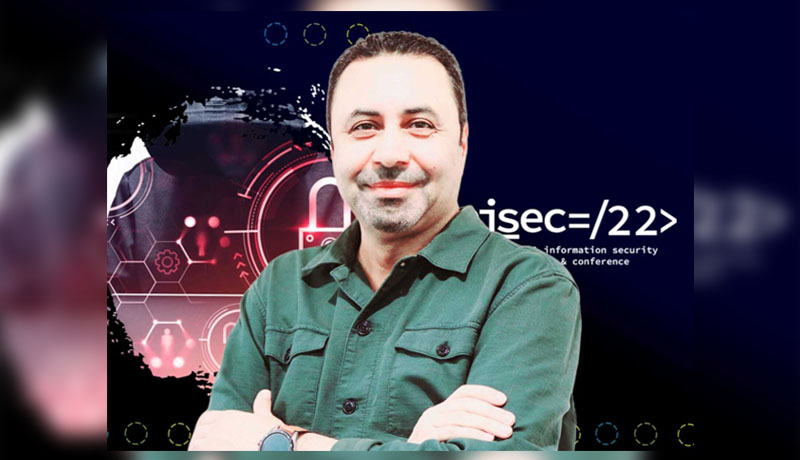
Ashraf Gaber, Regional Director Editorial & Publications – Africa & Nordic
Cairo ICT raised the slogan “Digital Challenges” in its twenty-fifth edition last November, and it was a logical interaction with the data results of the expansion of digital transformation applications and solutions, both at the regional and global level. This increased the risks to the same level, if not higher.
As the world faces a wave of unprecedented cyber-attacks on the websites of governments, businesses, and individuals, ransomware has emerged, with some businesses, and even countries, suffering massive losses as a result.
In a revealing response, Mr. Osama Kamal, President of Cairo ICT, launched the caisec’22 – Cybersecurity and Information Security Conference and Exhibition with the slogan “Cybersecurity in Times of Crisis,” which accurately describes the current situation.
The world is facing greater challenges, to the point of disabling government, military, and security sites, large and small businesses, banks, seizing personal accounts, and disrupting services, leading many to fear digital transformation despite its great value.
Over 11 sessions, at which 72 experts from inside and outside Egypt participated, caisec’22 developed a thorough understanding of the cyber situation and the vulnerabilities that threaten it, as well as solutions, since all of the speakers were experts, whether they were government officials, company representatives, or innovators and thinkers in the field.
The opening session was powerful and direct, in contrast to what usually happens in conference opening sessions, which used to be protocol in which speakers were satisfied with praise and greetings. Speakers at caisec’22 invested time in the substance of the issue, certain that it was serious.
In a rare appearance (for me, the first of its kind), Major General Ashraf Eliwa, the representative of the armed forces in the “Supreme Council for Cyber Security,” reviewed the major challenges facing countries, governments, and people, as the world faces fifth and sixth-generation wars, after we had been talking for years about fourth-generation wars!
He explained that fifth-generation wars focus on creating a contradiction between the state and society, then putting them on opposing sides of a conflict, while sowing doubts and underestimating every measure or project undertaken by the state.
“It’s managed remotely with smart systems, where the full capabilities of the Internet networks are mobilized, and through that, the entire cyberspace becomes a battleground, in which all forms of economic, social, and political wars gather,” said Major General Eliwa of sixth-generation wars.
He went on to say that cyber security is a complex battle in which some countries rise and others fall. He defined cyber threats as one of three types: crimes, wars, or terrorism.
In addition to electronic measures, he emphasized raising awareness in both the civilian and military sectors as a primary focus of the conflict.
caisec ’22 saw significant economic inputs, most notably Dr. Mohamed Maait, Egyptian Minister of Finance, who spoke about a comprehensive revolution in the field of financial transactions. He made it clear that taxes, customs, and all of the Ministry of Finance’s agencies have been completely digitized, and that there is no longer room for estimates or missing information, which is reflected in the legislator’s or decision maker’s clarity of vision.
Engineer Ahmed Mekki, Chairman & CEO of “Benya” Group, stated that cyber threats should not be used to impede action and progress, but rather to take precautions and take the necessary measures to mitigate their destructive consequences. Connecting technological progress to means of protecting it and investing in digital infrastructure.
He cited the expected losses of cyber wars, which exceed 10 trillion dollars over the next few years, after reports revealed that cyber threats cost the world $6 trillion last year alone.
Dr. Mohamed Farid Saleh, Chairman of the Egyptian Stock Exchange, was reassured about the capital market sector’s efforts in the field of cyber security, as the stock exchange was one of the first institutions to follow the path of digital transformation in the 1990s. Given the importance and sensitivity of financial transactions, pursuing and defeating cybercrime is an unavoidable option.
On the same subject, Ibrahim Sarhan, President of efinance, discussed the company’s reliance on advanced solutions on a continuous basis, as well as a strong and qualified work team to face any cybersecurity challenges, particularly because efinance works in the field of financial transactions, which does not tolerate any level of error, no matter how minor.
I followed caisec’22 with African eyes. The young continent, which thirsts for progress and seeks to catch up with all the trains that have passed through the magical gate known as “Digital Solutions,” also requires a double effort to secure its nascent cyberspace; the security challenges in this field are destructive if it manages, and its losses are greater than its modest economies can bear.
This places responsibility on caisec and its thinkers for Egypt’s natural extension in all directions, particularly the south. I hope that the next session, which was announced in November of this year, will include a special file on African cybersecurity as well as Arab and Mediterranean cyber security.